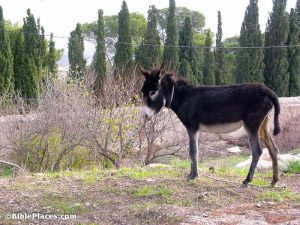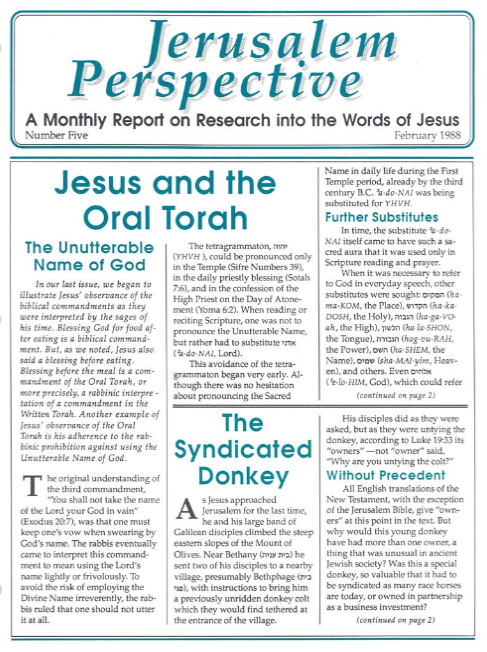As Jesus approached Jerusalem for the last time, he and his large band of Galilean disciples climbed the steep eastern slopes of the Mount of Olives. Near Bethany (בית עניה), he sent two of his disciples to a nearby village, presumably Bethphage (בית פגי), with instructions to bring him a previously unridden donkey colt, which they would find tethered at the entrance of the village.
His disciples did as they were asked, but as they were untying the donkey, according to Luke 19:33, its “owners” (not “owner”!) said, “Why are you untying the colt?”
A Usage Without Precedent
All English translations of the New Testament, with the exception of The Jerusalem Bible, give “owners” at this point in the text. But why would this young donkey have had more than one owner, a thing that was unusual in ancient Jewish society? Was this a special donkey, so valuable that it had to be syndicated as many racehorses are today, or owned in partnership as a business investment?
Commentators generally have understood the plural “owners” to mean “the owner and those with him” (ICC), or “its master and mistress, expressed merely as the plural” (Anchor Bible). However, there is no ancient precedent for this understanding. There are examples of two or more animals being owned by one man, but no substantial evidence of one animal being owned by several men.

A Possible Solution
Randall Buth may have provided a solution to this puzzle. He pointed out in his article, “Luke 19:31-34, Mishnaic Hebrew and Bible Translation: Is κύριοι τοῦ πώλου [kurioi tou polou] Singular?” (Journal of Biblical Literature 104 [1985]: 680-685), that in Hebrew בְּעָלִים (be’alim; “masters, lords, owners”), the plural of בַּעַל (baal; “master, lord, owner”), often is used in a singular sense.
The classic example of this usage is found in Exodus 21:29 in connection with the laws pertaining to a goring ox:
If, however, that ox has been in the habit of goring and its owner [literally, “owners”], though warned, has not kept it penned up [singular form of the verb] and it kills a man or woman, the ox must be stoned and its owner [literally, “owners”] also must be put to death [singular form of the verb].
Twice in this passage, the plural noun בְּעָלִים (be’alim; “owners”) appears with a singular verb, indicating that the noun is in fact used in a singular sense.
Singular Idiom
The same idiomatic use of this plural noun in a singular sense is found in Mishnaic Hebrew, except that the accompanying verb is usually in the plural. Ancient Greek and Aramaic translations of Scripture such as the Septuagint and the Targums render the idiomatic plural noun, “owners,” as “owner.” This suggests that the idiom was foreign to Greek and Aramaic.
In fact, this idiom does not exist in Greek or Aramaic. It is unattested in Greek literature and Jerusalem scholar and Aramaic specialist, Professor Michael Sokoloff, has confirmed that this idiom does not exist in any early Palestinian Aramaic text.
More Accurate Translation

Buth may have discovered a significant indicator, which may aid us in determining the language in which Jesus’ biography was originally written. Because Hebrew and Aramaic are so similar in their idioms, it is seldom that one can find in the texts of the Gospels a Hebrew idiom that is not also an Aramaic idiom. The be’alim (= “owner”) idiom, however, seems to be unique to Hebrew. It is all the more significant because it is found neither in the Septuagint nor in Greek literature in general.
As Buth has suggested in his article, if we assume a Hebraism behind the rather surprising plural, then the story reads more naturally. The owner, not “owners,” asked the two disciples, “Why are you untying the colt?”
This Hebrew idiom, sheltered in the Greek of Luke’s Gospel, is another example showing how translating the Gospel texts into Hebrew makes it possible to achieve a more accurate translation.

Paid Content
Premium Members and Friends of JP must be logged in to access this content: Login
If you do not have a paid subscription, please consider registering as a Premium Member starting at $10/month (paid monthly) or only $5/month (paid annually): Register
One Time Purchase Rather Than Membership
Rather than purchasing a membership subscription, you may purchase access to this single page for $1.99 USD. To purchase access we strongly encourage users to first register for a free account with JP (Register), which will make the process of accessing your purchase much simpler. Once you have registered you may login and purchase access to this page at this link:































































































